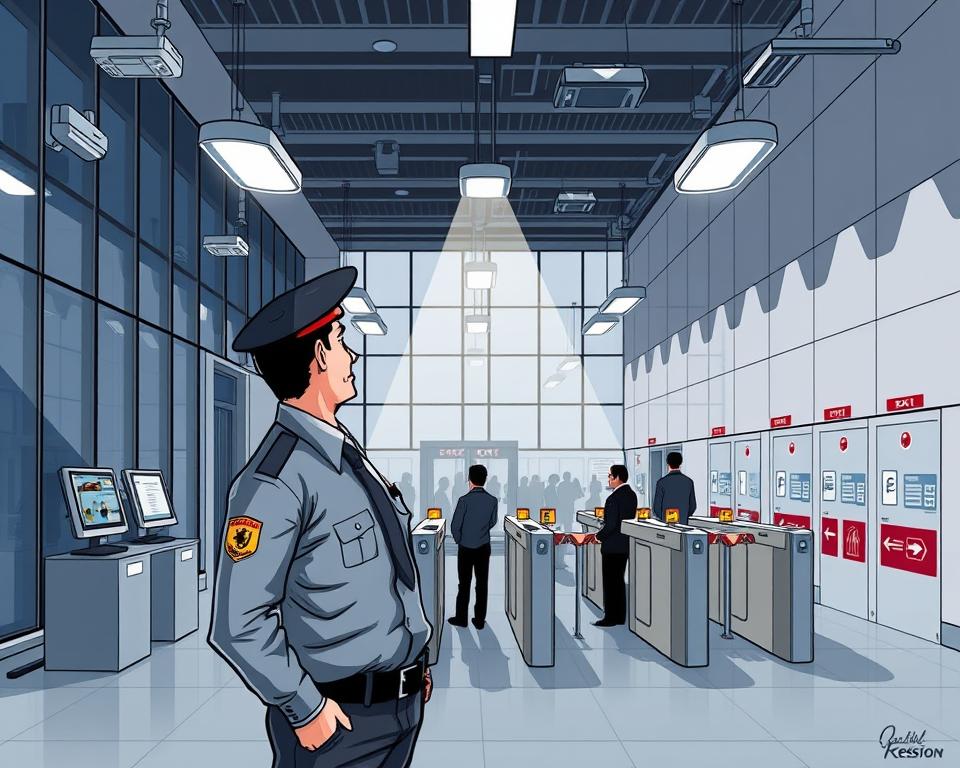Enhancing Security through Hospital Security Guards
Were you aware that hospitals endure about 30 violent events every day? This startling data emphasizes how vital Hospital Security Guards are. They protect not just patients but also staff and confidential information. In the rapidly evolving health sector, strong Healthcare Facility Security is paramount. It’s about creating safe spaces where patients can get care without fear of violence or data breaches.
Aligning with veteran agencies like Divine Protection Services improves Medical Center Security Services. This guarantees that security remains foremost while maintaining accessibility. This article examines how property patrol solutions and surveillance systems can significantly improve security protocols. It deals with both internal and external risks competently.

Important Discoveries
- Hospital Security Guards are essential for safeguarding patients, personnel, and confidential information.
- Healthcare Facility Security is key to preventing violence and securing privacy.
- Integrated security systems enhance the overall effectiveness of medical center security services.
- Aligning with organizations like Divine Protection Services provides bespoke security solutions.
- Cutting-edge technologies underpin contemporary healthcare security strategies.
- Harmonizing accessibility with confidentiality is necessary for successful hospital security practices.
The Critical Role of Hospital Security
Hospital security is vital for protecting patients, employees, and private information. The escalation of violence in medical environments points to the importance of vigilant Hospital Security Guards. Such guards are crucial for sustaining a protected atmosphere and preserving the rights and dignity of all.
Executing strong Healthcare Facility Security approaches is essential to avoid aggression. This aids in building a supportive environment, bettering the patient and family experience. It additionally secures conformity with rules such as HIPAA, enforcing secure access to safeguard Protected Health Information (PHI). These actions not only defend patients but also nurture trust between healthcare teams and their communities.
| Security Measure Type | Value | Adherence to Rules |
|---|---|---|
| Access Control Systems | Restrict unauthorized entry and access | Vital for meeting HIPAA requirements |
| Surveillance Cameras | Observe events and prevent illicit acts | Supports regulatory requirements for safety |
| Emergency Response Plans | Offer immediate action during crises | Compliant with safety and emergency management guidelines |
| Training for Security Personnel | Prepare personnel with crisis management abilities | Meets required safety and security norms |
Committing to comprehensive security solutions and staff training is indispensable for protecting hospitals and health centers. These guidelines secure a protected and compliant setting, key to offering top-notch patient services.
Function of Hospital Security Guards
Hospital security staff fulfill an essential duty in ensuring the protection of healthcare settings. They supervise entry areas to prevent unauthorized access, address emergencies, and utilize conflict de-escalation to avoid threats. With training from Divine Protection Services, they can spot and manage signs of agitation or violence.
Their presence is fundamental to maintaining the health and security of patients and staff. They secure the hospital’s processes, critical for a healing setting. By ensuring security, they improve the patient experience and reduce risks.
Modern Technologies in Healthcare Security
Current healthcare facilities incorporate Advanced Technologies to enhance security efforts. Medical Center Security Services skillfully combine technologies such as AI-enabled cameras to boost monitoring functions. These cameras offer real-time tracking and analysis, enabling staff to identify and respond to threats swiftly.
One of the key aspects of Healthcare Security Solutions is the use of access control systems. Such systems limit entry to protected areas, guaranteeing that only permitted individuals enter vital sections. By leveraging biometric authentication, medical centers can integrate extra security around patient data and vital medical apparatus.
Artificial intelligence security applications are pivotal for physical safeguarding. Facial scanning and conduct detection help security staff to act swiftly on security violations. Sophisticated video analysis supports incident-driven decision-making, providing ongoing scrutiny of healthcare settings. This creates a safe atmosphere for patients and staff.
| Innovation | Use Case | Gains |
|---|---|---|
| AI-driven Surveillance | Instant observation | Quick risk detection |
| Access Control Systems | Regulated entry | Protection of sensitive areas |
| Facial Recognition | Personal identification | Blocking illicit entry |
| Video Analytics | Operational oversight | Data-driven decision-making |
Cutting-Edge Technologies shield hospital belongings and foster a safe environment for all. By employing these advanced technologies, healthcare facilities can maintain vigilance against threats. This secures quality care delivery for patients.
Healthcare Security Methods
Solid Healthcare Facility Security frameworks are crucial for defending patients, staff, and visitors in healthcare centers. Conducting thorough security risk assessments is the cornerstone of these strategies. By identifying vulnerabilities, healthcare facilities can craft specific protocols for various scenarios. This elevates their preparedness for any possible incidents.
It’s essential to urge the reporting of irregular conduct and risks. Healthcare institutions must establish mechanisms to handle those alerts immediately. This proactive view in Healthcare Facility Security cultivates a culture of shared safety.
Visitor management is a critical aspect of Medical Center Security Services. Ensuring only authorized individuals enter helps maintain a secure environment. Watching over patient-caregiver interactions helps diminish risks. This creates a safer space for all. Here is a table summarizing essential parts of robust security strategies.
| Security Module | Description | Advantages |
|---|---|---|
| Risk Assessments | Identifying vulnerabilities and assessing possible threats. | Enhances readiness and reaction speed. |
| Incident Reporting | Motivating staff and visitors to flag unusual behavior. | Supports quick reactions to dangers and boosts awareness. |
| Visitor Management | Procedures for overseeing and regulating facility entry. | Fortifies security and lessens unapproved entry. |
| Staff Training | Providing security training for employees. | Empowers staff to handle security incidents effectively. |
Educating Security Staff Properly
Comprehensive education of healthcare security teams is essential for ensuring safety in hospitals. Continuous education helps staff adapt to new challenges. It additionally improves their skill in handling diverse incidents.
Divine Protection Services highlights nurturing excellent situational awareness in security officers. This includes learning conflict management skills for high-stress interactions. Frequent drills and mock scenarios strengthen procedures. Teams are trained to address dangers effectively while preserving dignity and respect.
This method of preparing security staff transcends mere defensive tactics. It nurtures a culture of protection and expertise in hospital settings. By concentrating on fundamental abilities, hospitals ensure their security officers manage challenges adeptly.
Adhering to Regulatory Standards
Meeting Regulatory Standards is vital for hospitals seeking security and trust. HIPAA, in particular, demands secure entry controls to shield Patient Health Information (PHI). These protocols prevent unauthorized access and breaches of sensitive data.
Medical centers can enhance their compliance by implementing comprehensive policies. These include regular audits, staff training, and clear incident reporting processes. These practices not only safeguard patient health but also cultivate community trust.
Agencies like Divine Protection Services supply bespoke compliance strategies for hospitals. Their knowledge in Hospital Security Services guarantees that security staff are properly prepared to adhere to regulations.
Devotion to compliance mitigates risks and fosters solid patient-provider bonds. A proactive view on regulations aids the entire healthcare infrastructure.
Hospital Security Officers in Practice
Hospital Security Staff serve a key function in keeping healthcare settings secure. Their duties are evident in various real-world instances, demonstrating a forward-thinking approach. In one case, they address altercations in reception areas, promptly de-escalating them to impede violence.
In tense moments, these officers escort individuals to safe places, supporting them in their time of need. This step protects vulnerable individuals and fosters a tranquil environment. Their collaboration with authorities during critical events spotlights the role of Professional Healthcare Security. They often serve as the first line of response.
Instruction from Divine Protection Services equips these guards to manage crises effectively. They acquire skills to uphold policies while maintaining respect for all. This blend of authority and compassion turns them into vital components of the healthcare team. They commit to ensuring security and protection for everyone on site.
Customizing Security Solutions for Healthcare Facilities
Healthcare facilities face unique security challenges that demand a tailored approach. Tailoring Security Solutions is essential for confronting these matters, ensuring safety for both patients and staff. Collaborating with specialists such as Divine Protection Services allows hospitals to develop security plans tailored to their exact requirements.
A well-rounded security program covers critical areas like violence prevention and medication security. Through advanced tech, facilities can enhance their security practices while following HIPAA guidelines. This frequently encompasses visitor oversight systems and responsive access control methods tailored to evolving needs.
The role of Medical Facility Guards is also vital. They undergo dedicated training to address security events and remain continually alert. Their deployment discourages danger and provides peace of mind to staff and patients.
The table below shows how Customizing Security Solutions addresses various healthcare challenges:
| Challenge | Custom Solution |
|---|---|
| Violence Prevention | Educating Medical Facility Guards in conflict de-escalation methods |
| Medication Security | Installation of secure medication storage and monitoring systems |
| Visitor Management | High-level visitor vetting and credential issuance procedures |
| Access Control | Flexible access control platforms that adapt to operational demands |
Through meticulous planning and collaboration with suitable partners, medical centers can build a solid security stance. This comes from Personalizing Security Solutions to fit their individual needs. Uniting careful human monitoring with tech solutions substantially bolsters security, creating a safer, more effective healthcare space.
The Final Word
Securing the safety and health of patients, personnel, and confidential data is critical in hospitals. Hospital Security Guards now use advanced technologies and training to combat modern threats. This advancement not only shields physical premises but also strengthens trust between patients and healthcare professionals.
Personalized Healthcare Security Solutions allow hospitals to excel in the shifting security terrain. Working with veteran companies like Divine Protection Services empowers medical facilities to address security issues competently. By integrating workforce training with advanced tech, hospitals can develop a safe environment for medical treatment and care.
The health sector grapples with escalating risks, making professional security steps vital. Hospitals have to integrate these progressing strategies to fortify their environments and uphold operational honor.


